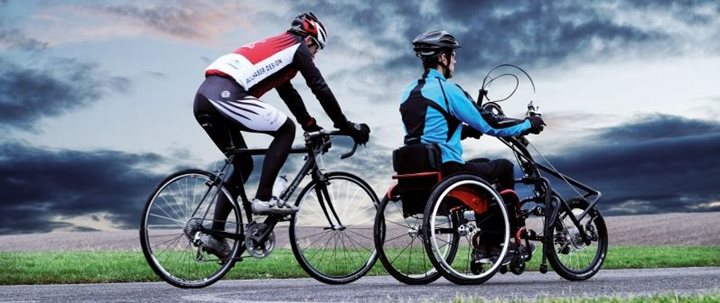Share:
Take it offline!
This Education in Motion resource is also available as a printable PDF.
Download PDF
Sport is a fantastic way to socialise, keep fit and beat stress, not to mention its therapeutic and rehabilitation properties. With the rising popularlity of the Paralympic Games, sports and disability are becoming increasingly interlinked and with the support of a health professionals and trained sports coaches more accessible to all, to help you lead an active life.
Sports and disability: a relationship that comes from afar
To establish an origin of the relationship between sports and disability, we must go back to the end of World War II and to Stoke Mandeville Hospital (England), where Sir Ludwig Guttmann founded a centre for patients with spinal cord injuries. In this centre, he introduced sport, assuring that it was beneficial for his patients, to first train the body and second, to avoid the boredom of hospital life.
Guttmann was also convinced that his practice favoured the self-discipline, companionship, and self-esteem of his patients; three essential values for the social reintegration of people who had suffered from spinal cord injuries and amputations.
Having proven the benefits of the relationship between sports and disability, his practice was extended from the 1960s and 70s thanks to the regulation of some adapted sports and the creation of organisations and federations at international, national, regional and local level, focused on people with different types of disabilities, among which were:
• ISOD (International Sports Organisation for the Disabled) created in 1964;
• ISMWF (for people in wheelchairs, now IWASF);
• IBSA (for the visually impaired);
• CP-ISRA (for persons with cerebral palsy);
• INAS-FMH (for the mentally disabled, now INAS-FID).
As you can see, what began as a rehabilitation treatment for people with disabilities ended up becoming the worldwide athletic movement that we know today.

Sports provide an excellent opportunity for many disabled people to lead an active life, for many reasons.
The first one is that sports can facilitate rehabilitation and serve as a therapy for people with a physical (motor), intellectual (psychological) or mixed (psychomotor) disability to regain mobility or improve it.
Taking part in sports also perfectly complements rehabilitation, and provides an opportunity for the development of self-esteem.
Benefits of sport
- An opportunity to make new relationships outside of immediate family or a medical-related environment
- Helps to get rid of toxins
- Increases energy levels
- Promotes agility
- Eliminates stress
- Aids relaxation
- May provide a sense of ‘social inclusion’
- Promotes self-improvement and personal development, especially in the case of competitive sports
If a person plays a sport in a fun or recreational way, it can encourage integration and reconcile the relaxation of family and caregivers. If sports are played competitively, other very important factors such as self-improvement come into play. As with non-disabled people, the achievements and progress made during the practice of a sport at the highest level increase personal autonomy and help overall personal development.
Of course, before practicing any sport, a doctor or physiotherapist should be consulted to determine if it’s compatible with your disability. If you want to practice recreationally, places such as community centres, sports centres,schools, clinics and hospitals can advise you and give you information, while if you are looking to take part in competitive sport, the following professionals and teams can help you:
• CPISRA (Federation of Sports and Recreation for People with Cerebral Palsy)
• IBSA (Federation of Sports for the Blind)
• ISMWSF (International Federation of Wheelchair Sports)
• INAS-FID (Federation of Sports for People with Intellectual Disabilities)
Due to more and more people playing more adapted sports and the professionalization of them, it has become very important to have wheelchair sports adapted to the requirements of each discipline.
That's why at Sunrise Medical we offer a range of wheelchairs for demanding athletes, where you will find specific chairs for playing adapted tennis, wheelchair basketball or hand biking.